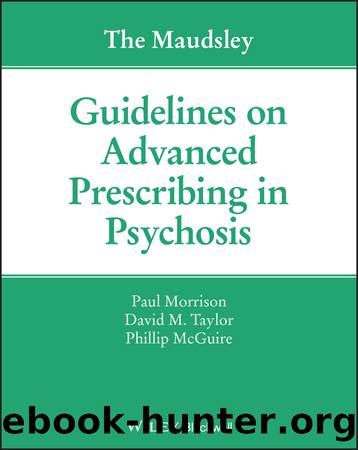The Maudsley Guidelines on Advanced Prescribing in Psychosis by unknow

Author:unknow
Language: eng
Format: epub
Publisher: John Wiley & Sons, Incorporated
Published: 2019-12-31T00:00:00+00:00
Drugs which have high affinity for muscarinic acetylcholine receptors in the basal ganglia have a reduced propensity for EPSEs. This is the case for thioridazine (now discontinued) and olanzapine.
It was believed that antagonism of serotonin 5HT2a receptors protected against EPSEs, but many of the firstâgeneration drugs have high affinity for 5HT2a receptors. Also the addition of a pure 5HT2a antagonist to a potent D2 regime has no discernible effect on EPSEs.
Quetiapine and clozapine have low affinity for the dopamine D2 receptor, and relatively higher affinity for muscarinic acetylcholine receptors. The risk of EPSEs are negligible to the extent that clozapine (but probably not quetiapine) is a treatment option in psychosis arising in the context of idiopathic Parkinson's disease [311]. A new agent, pimavanserin, an inverse agonist at 5HT2A and 5HT2C receptors, may have efficacy for psychosis occurring in Parkinson's disease [312, 313], although there has been some controversy [314].
Risperidone, amisulpride, ziprasidone, and asenapine can cause EPSEs.
Aripiprazole, cariprazine, and lurasidone are associated with akathisia.
Download
This site does not store any files on its server. We only index and link to content provided by other sites. Please contact the content providers to delete copyright contents if any and email us, we'll remove relevant links or contents immediately.
Periodization Training for Sports by Tudor Bompa(8274)
Why We Sleep: Unlocking the Power of Sleep and Dreams by Matthew Walker(6726)
Paper Towns by Green John(5191)
The Immortal Life of Henrietta Lacks by Rebecca Skloot(4589)
The Sports Rules Book by Human Kinetics(4388)
Dynamic Alignment Through Imagery by Eric Franklin(4217)
ACSM's Complete Guide to Fitness & Health by ACSM(4060)
Kaplan MCAT Organic Chemistry Review: Created for MCAT 2015 (Kaplan Test Prep) by Kaplan(4014)
Introduction to Kinesiology by Shirl J. Hoffman(3776)
Livewired by David Eagleman(3775)
The Death of the Heart by Elizabeth Bowen(3622)
The River of Consciousness by Oliver Sacks(3605)
Alchemy and Alchemists by C. J. S. Thompson(3522)
Bad Pharma by Ben Goldacre(3428)
Descartes' Error by Antonio Damasio(3279)
The Emperor of All Maladies: A Biography of Cancer by Siddhartha Mukherjee(3163)
The Gene: An Intimate History by Siddhartha Mukherjee(3099)
The Fate of Rome: Climate, Disease, and the End of an Empire (The Princeton History of the Ancient World) by Kyle Harper(3067)
Kaplan MCAT Behavioral Sciences Review: Created for MCAT 2015 (Kaplan Test Prep) by Kaplan(2987)
